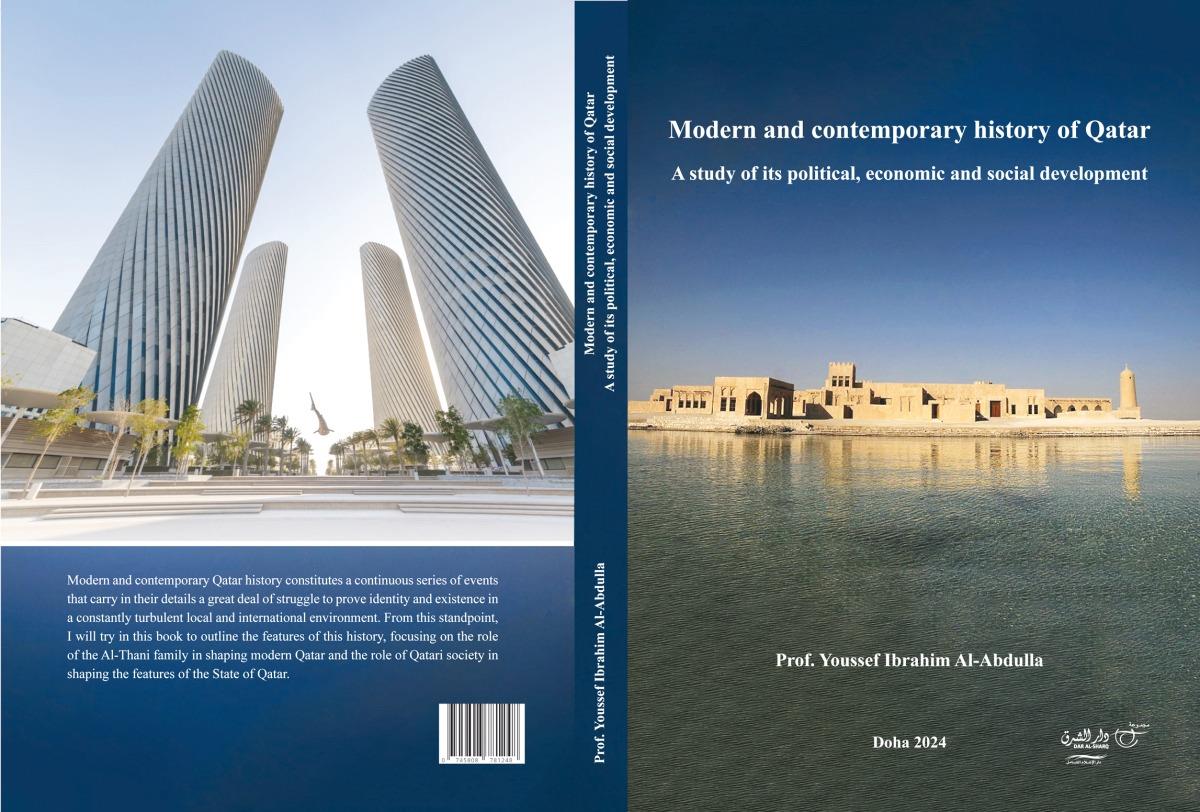
Book Showcases Modern And Contemporary History Of Qatar
Doha: The“Modern and Contemporary History of Qatar, A Study of its Political, Economic and Social Development” is a book authored by Dr. Yousef Ibrahim Al Abdullah.
The book features the modern and contemporary history of Qatar and focuses on the role of the Al Thani family in shaping modern Qatar, and the role and contribution of the society in shaping the features of the state.
“The 232-page book has been published in Arabic and English,” Dr. Yousef Ibrahim Al Abdullah, Professor of Modern History at Qatar University, told The Peninsula.
He said that the book discusses the main issues in Qatar's history and its development during the modern era, tracing historical events and the local and international factors that influenced the historical positions.
Dr. Yousef Ibrahim Al Abdullah.
“Perhaps what distinguishes this book from others is that it deals with the period from the sixteenth century until the reign of Amir H H Sheikh Tamim bin Hamad Al Thani (which is a long period of time),” said Dr. Al Abdullah.
The book is written in a simple style, aiming to allow young Qatari students to learn about their history from the founding of the state until the present time, he added.
Therefore, he said, the diversity of historical sources has enriched the book.“At a time when we are focusing on preserving identity, history is one of the identity indicators.”
“I wish to complete my research project on the history of Qatar and the Gulf region, which aims to enlighten Qatari youth about their history and heritage,” said Dr. Al Abdullah. He said that his next book will be on the history of the Arabian Gulf focusing on the history of Qatar to study the influences among the Gulf societies.
The book's introduction emphasises that the modern and contemporary history of Qatar constitutes a continuous series of events that carry in their details a great deal of struggle to prove identity and existence in a constantly turbulent local and international environment.
“I also highlighted the purpose of the book and its chapters. In contrast, the introduction began with the geography of Qatar due to the impact of the geographical position and situation on the political, economic, and social conditions and political and social conditions of Qatar before the emergence of the Al Thani family,” he said.
The book is divided into six chapters and a conclusion. The first chapter dealt with the emergence of the Al Thani family, the role of Sheikh Mohammed bin Thani in Qatari politics, the Qatari-British Treaty of 1868, and its importance in recognizing the independent international personality of Qatar.
“In the second chapter, I focused on the founding stage during the reign of Sheikh Jassim bin Mohammed Al Thani, which extended from 1878 until he died in 1913, discussing the position of Sheikh Jassim bin Thani on the Ottoman campaign on Ahsa in 1871, and his policy towards the Ottomans, in addition to my discussion of the British position on the Ottoman-Qatari rapprochement, and the Battle of Al Wajbah in 1893. Also, I discussed Sheikh Jassim's efforts to end the Ottoman presence until the signing of the British-Ottoman agreement in 1913,” he added.
“I devoted the third chapter to the era of Sheikh Abdullah bin Jassim Al Thani, which was characterized by some important issues, the most important of which was the signing of the Qatari-British Treaty of 1916. Among the features of Sheikh Abdullah's era - which the book mentioned - was the signing of the oil exploration agreement with the Anglo-Persian Company in 1935.
I devoted the fourth chapter of the book to the second half of the twentieth century, as this stage covers the era of Sheikh Ali bin Abdullah and Sheikh Ahmed bin Ali, which is the period that extended from 1949 until 1972, during which Qatar tried to get rid of British influence until declaring independence in 1971.
The fifth chapter dealt with the modern renaissance in Qatar during the reign of Father Amir H H Sheikh Khalifa bin Hamad Al Thani - 1972-1995, and the prosperity of the state during the reign of Father Amir H H Sheikh Hamad bin Khalifa Al Thani - 1995-2013, and Qatar's launch into the world, in addition to the reign of Amir H H Sheikh Tamim bin Hamad Al Thani, since he assumed power in 2013, in which Qatar is witnessing unprecedented leaps towards sustainable development, and development to keep pace with the technological journey that the world is experiencing.
The sixth chapter is devoted to addressing the social and economic conditions and the development of administrative systems in Qatar during the stages of its modern history, especially the demographic structure, the transition of society to modernity, and the crafts and industries that society practised throughout its history.
The book relied on original historical sources, most notably British documents, India Office Records, and the British Foreign Office Collection. It also relied on a collection of published British documents, a collection of Qatari history documents translated by Ahmed Anani, and a series of photographic archival editions of the original documents.
The author has published many books including Jassim bin Mohammed bin Thani, Coordinator and Editor of the Historical Symposium Research Accompanying the Celebrations of Qatar National Day 2008 and The Modern and Contemporary Development of Qatar, chapters of Political, Social, and Economic Development.

Legal Disclaimer:
MENAFN provides the
information “as is” without warranty of any kind. We do not accept
any responsibility or liability for the accuracy, content, images,
videos, licenses, completeness, legality, or reliability of the information
contained in this article. If you have any complaints or copyright
issues related to this article, kindly contact the provider above.


















Comments
No comment